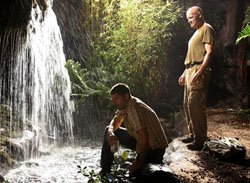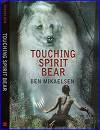 Kelsey Grammer for Governor? Is California dying?
Kelsey Grammer for Governor? Is California dying?By Bernie Quigley
- for
The Hill on 1/12/09
The train hasn’t left the station yet and already they are feeling post-seasonal. Diane Feinstein, the Senator from California, is speaking out: Why wasn’t she informed ahead of time that Leon Panetta, a former Clinton employee who now works in a vineyard in California, I think, was appointed chief of the CIA?
I used to have a lot a CIA types in my old neighborhood and was wondering about that myself. I though we liked to use Mormons for jobs like that.
There was no reason she should have been informed. She just wants to be the first to scold Obama. The first, that is, to put him in his place.
But Obama knows how this works as everyone in Chicago does. It is the most territorial of all the political regions and networks; a virtual Miller’s Crossing of vying political tribes and ethnic groups and Obama has long mastered the lore of territoriality.
But for Feinstein, it’s not about her appointment to head the Select Committee on Intelligence next month. It’s about running for Governor in 2010.
She might have a little competition. Recently, on Mike Huckabee’s new TV show, Kelsey Grammer, star of the award-winning Frasier and a McCain/Palin supporter, announced that he might be considering running for political office in the near future.
Huck egged him on, saying he would work for him or work against him, whichever he thought would help the most.
Grammer admitted that his life had not been as button down as Frasier’s, and he did have a few skeletons in the closet. But he felt they had all been adequately aired.
I checked him out on Wiki and it’s a pretty spicy contrast. But nothing so exciting as when Andrew Jackson took to the Oval Office still with a bullet lodged an inch from his heart, the result of a frontier duel with a political antagonist. And anyway, so long as you haven’t done any longish felony time or any crime with an axe or fire, it can all be spun as a plus in our day.
In fact, it was Jackson’s feisty past; the frontier duels, the gambling and free love in the forest . . . the horse racing, the conquering spirit of the Scotch-Irish which formed the character of the western states in the South and Southwest, that brought national appeal to his candidacy.
Because Americans get bored and in 1829 when Jackson went to the Presidency we were bored. Bored with Adams, Jefferson and even Washington. Bored with Congress. Bored with Harvard. Bored with the East and candidates who made their pitch to the people saying they were editors of the Harvard Law Review. Bored with lawyers and suits.
And by 2010 we might be bored again.
Obama’s Roosevelt refrain is not the most original narrative. Stocks today are only where they were eight years ago when some smart observers said they were getting overvalued. A drive over Christmas from New Hampshire to Atlanta and across the Smokies to Nashville found hardly more than one car enroute with more than 150,000 miles on it, my own. And at least half of the people who listen to Cat Jackson, Shania Twain and the Stanley Brothers on the radio appear to have just bought one of the brand new Ford F 150s, still with the white tags on the rear. The New Great Depression narrative could fade in two years, just as Bush’s phony WW II narrative about Iraq grew quickly old.
“Maybe Obama can pull this off,” David Brooks of the New York Times wrote recently, “but I have my worries. By this time next year, he’ll either be a great president or a broken one.”
I didn’t see much on Grammer’s vita to suggest a political career, but he dresses well and sings like Bobby Short. Then again, Caroline Kennedy, who has recently found the voting place on 64th Street, says, you know, a lot of people these days are taking different paths to politics.
And to political journalism as well don’t you know. There’s nothing in the resume of a charming and popular afternoon TV hostess like Oprah to suggest she could springboard a virtually unheard of politician to a brilliant career. And nothing to suggest that a midnight vaudevillian and second rate TV ad actress like Tina Fey or a morning coffee TV lifestyle reporter like Katie Couric, brand new to serious political discussion of world affairs and conspicuously anxious to sit at the table with the grown ups, could destroy one in a week.
We might be better off with this no experience thing. In the olden days – commentator Paris Hilton’s term – it took the rhetorical skill and swagger of a veteran neurotic like Joe McCarthy to have such public impact.
And in California, where two of the most impressive Governors have been actors, political experience – like Feinstein’s - could well be a negative. Right now Meg Whitman, a manager and business person, seems to be held in high regard precisely because she has no political experience.
Grammer could enter as an outsider, and there he could just possibly find his moment. Arnold Schwarzenegger, The Goverator, brought to office on a frantic hope, like Obama, has failed to save California.
Reality is setting in. Devin Nunes, a California representative, says the gold rush is being reversed. In a recent op-ed in The Wall Street Journal, he reports that California has the sixth largest tax burden in the country and a 40 billion dollar deficit. In 2000, according to the state's Department of Finance, about 150,000 people moved into California, Nunes reports. But in the years that followed the in-migration slowed, and in 2005 it reversed, when a net 52,000 people moved out. In 2008, the outflow topped 135,000 people.
“After more than 150 years of being a destination, California is becoming a place entrepreneurs, investment capital and the hardy workers who made it a global leader in agriculture, technological innovation and scientific research are fleeing. This exodus is the marker of something deeper than a national recession. It's a sign that the attempts by state leaders to spend their way back to prosperity are killing California.”
And if California fails, America fails.
What California needs, says Nunes is a “citizen’s legislature.” “Californians need to be able to elect leaders whose primary interest is public service, not furthering political careers,” he writes.
Grammer should pay heed. As trade broadens across the Pacific, California faces its greatest opportunity. It is virtually the center of the world before us which historian Niall Ferguson calls Chimerica. Arnold’s “post partisanship” has proved illusory and the Democrat who preceded him was an abject failure.
California needs a new direction and Nunes’s “citizen’s legislature” could strike a cord. It is a new off-Broadway play looking for an actor. This is, again, a California tradition. Ronald Reagan’s success in California and in Washington came after he had tapped his rhetorical skills as a public performer to market and advance new ideas.
And if Obama’s 1930s-era strategy, originally designed for a labor force made up almost in it’s entirety of immigrant factory workers and illiterate field hands, fails, it will have a slingshot effect. The whole country will be in the same dire straights that California is today. It’s credit rating is tied to last with Louisiana by Standard and Poors when it should be first.
We will actually need change, and not simply as a rhetorical flourish. We will need change to survive. Change like Andrew Jackson brought. In his rise to the Presidency two new political parties followed in his wake.
What you really need today in politics is a narrative like Obama’s Dreams from My Father or John McCain’s Faith of my Fathers. Grammer’s Frasier story might work.
It won’t show in the credits but Frasier is an American Quaternity; an archetypal and mythical vision of trail’s end in Seattle. It is a vision of a broken Camelot: The Father, an honest cop who represents traditional authority, is crippled and incapacitated by “a punk” in a world which has lost its center. Mother is dead and in a fully corporatized and artificial environment, sustained marriage and the simple life of family is virtually impossible. Frasier himself is divorced from Lilith – the biblical version of Kali, the Death Mother – and though he longs for family and stability, he sees his only son but once a year, at Christmas.
In good faith, Frasier hopes and thinks he can repair this world – naively, perhaps, like Grammer. But he is alone in this to carry the flame: Frasier is the True Son in the Quaternity - with only Trickster brother Niles and the clairvoyant spirit Daphne for help and solace - on whose head responsibility for the fate and salvation of the tribe – in this case the world – lies. He is the last Templar, hoping to restore the temple in a New Jerusalem in Seattle; the last outpost on a journey across oceans and millennia that has reached its edge; facing the East now across the Pacific.
It is not a bad narrative and is one which reveals itself in moments of grace. Like in the episode at the end of a brief fling with his corporate boss who hopes to spend her days ahead in early retirement raising horses in Montana. Frasier says wistfully he’d prefer to raise kids, so simple but so impossible a dream in leisure-class Seattle at the turn of the century.
Like Frasier in Seattle, and Jackson in Tennessee, we Americans are all to varying degrees strangers in a strange land. The Boulevard of Broken Dreams, where Grammer may seek office, is the true end of our long, westward journey and it will be from there that we find our way back to ourselves.
Frasier helped. Maybe Kelsey Grammer can help again.




























